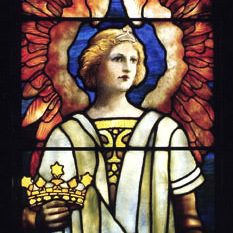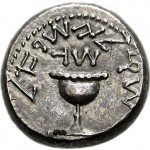 As I mentioned in my previous post, Andrea Garrison’s book In the Presence of Angels is written with the assumption that people become angels. Garrison writes, “We are in essence angels in training preparing for a higher level of service.” That’s not a foreign idea in our culture – e.g., Clarence the angel from It’s a Wonderful Life was a man who died during Mark Twain’s era – but most Christian and Jewish traditions would consider this to be inaccurate, teaching instead that angels are a separate created type of being. But according to Emanuel Swedenborg, it’s true – angels are simply departed human beings.
As I mentioned in my previous post, Andrea Garrison’s book In the Presence of Angels is written with the assumption that people become angels. Garrison writes, “We are in essence angels in training preparing for a higher level of service.” That’s not a foreign idea in our culture – e.g., Clarence the angel from It’s a Wonderful Life was a man who died during Mark Twain’s era – but most Christian and Jewish traditions would consider this to be inaccurate, teaching instead that angels are a separate created type of being. But according to Emanuel Swedenborg, it’s true – angels are simply departed human beings.
Now, it’s fairly difficult to prove this conclusively from the Bible – but it’s also fairly difficult to prove from the Bible that angels are not departed people. Contrary to what some may think, the Bible doesn’t answer this decisively either way. And in fact there are some indications that angels are people who have lived in this world.
The Swedenborgian website “What the Bible Says” includes a page with a number of Scriptural references indicating that angels and people are of the same race. For example, there are several stories in Scripture where the same angel will sometimes be called “a man” and at other times “an angel” (e.g. Judges 13:3,6,8-11).
But perhaps the strongest evidence that an angel is the spirit of a person who has departed can be found two passages in Acts. The first of these is in chapter 12 of Acts, which describes Peter’s miraculous escape from prison and his appearance to the other Christians at the house of Mary. When Peter arrived at the door, the servant girl recognized his voice, and was so excited that she left him there and ran back to tell the others that he had arrived. They did not believe her; but when she insisted, they said, “It is his angel” (Acts 12:15) The assumption seems to be that a person has “an angel” that can be mistaken for the person themselves.
Scholars disagree on exactly what this means. Some scholars argue that this reference to an angel is not to the person’s spirit, but to his guardian angel. But many scholars do support the interpretation that Peter’s “angel” means his departed spirit. And this reading is further supported by the second similar reference to angels in the book of Acts.
That occurs in Acts 23 in which a dispute arises between the Pharisees and Sadducees over the reality of the resurrection. Acts 23:8 says, “For Sadducees say that there is no resurrection—and no angel or spirit; but the Pharisees confess both.”
There’s disagreement about how to read this. The Sadducees almost certainly believed in angels in the sense of heavenly messengers sent from God (the word for “angel” literally means messenger, both in Hebrew and in Greek), since they held the five books of Moses to be authoritative scripture, and angels make several appearances in those books. What the Sadducees did not believe in was the resurrection from the dead, and so to me the most obvious reading of this statement in context is that they did not believe in an angel as something akin to a person’s “spirit” that was living on past death. That reading has support from numerous scholars, including David Daube and N.T. Wright (see this blog post from Ken Schenck, Dean of Wesley Seminary at Indiana Wesleyan University).
Of course, most of those scholars would say that these references do not imply that all Biblical references to “angels” refer to people who have died. But the fact that the term is sometimes used this way, I think, opens up that possibility; and at the very least it makes it hard to argue, as some do, that the only Biblical way to view angels is as a separate category of being, created independently from humans.
(Image is of “The Angel of Smyrna,” from the exhibit “In Company with Angels,” an exhibit of seven restored stained-glass windows created by Tiffany Studios in the early twentieth century for the Church of the New Jerusalem in Cincinnati, Ohio.)












